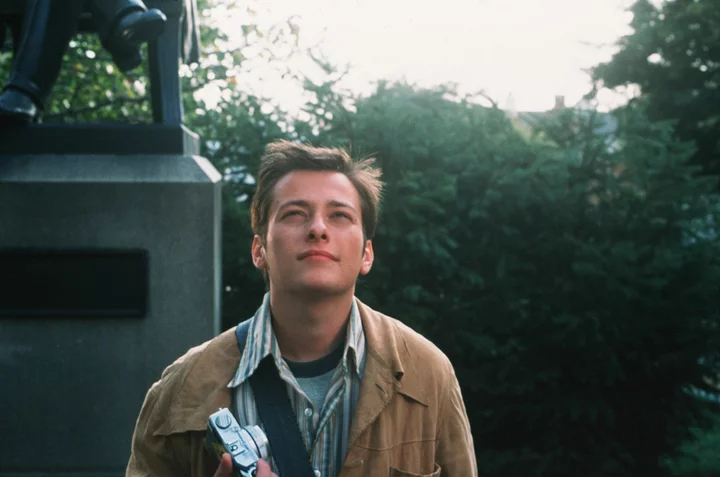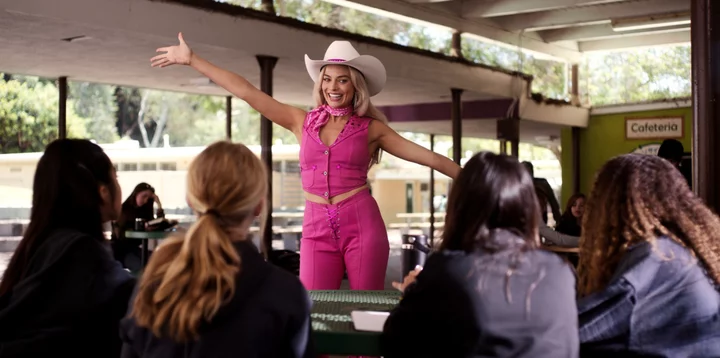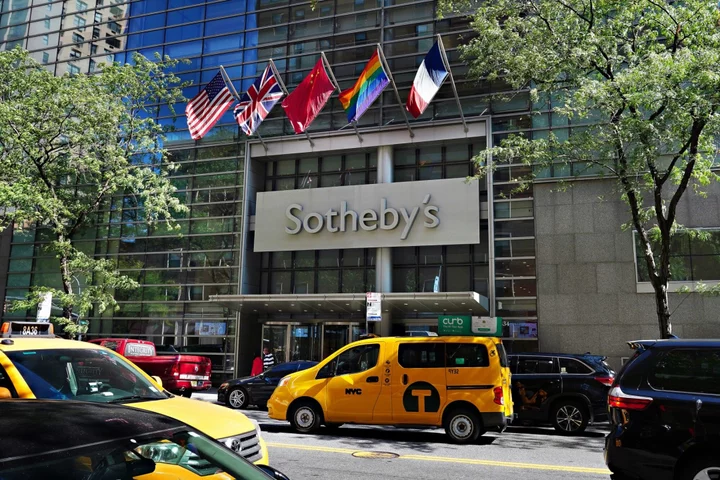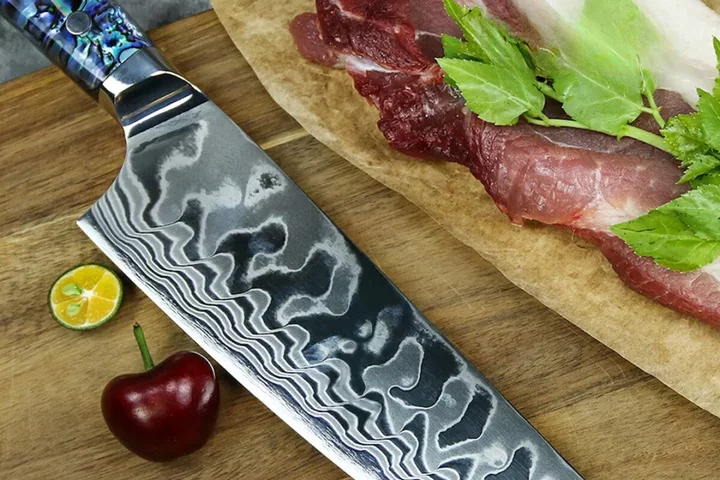The legend and icon John Waters, a mustachioed Maryland man who talked the drag queen Divine into eating a dog turd on film in his 1972 cult classic Pink Flamingos, has spent this past week being fêted by the Hollywood elite. A massive retrospective devoted to his filmmaking career, John Waters: Pope of Trash, has just opened at the Academy Museum, perfectly coinciding with the director getting his own star on the Hollywood Walk of Fame. "I'm closer to the gutter than ever," Waters giddily announced in his acceptance speech. "I'm so respectable, I could puke," he quipped at the Academy Museum opening.
That tension between Waters's Baltimorean outsider status and a more mainstream kind of acceptance has been the itchy red spot burning upon the groin of his six-decade-long career. In 1981's Polyester, a teen girl screams, "I'm gonna get an abortion, and I can't wait!" His next film, 1988's Hairspray, was rated PG, though it still retained Waters's trickster edge, with his muse Divine as matriarch Edna Turnblad and its critiques of racism and hypocrisy. Hairspray was, of course, eventually remade into a hit Broadway musical, which was then adapted into the 2007 big budget movie starring the superstar John Travolta. Even now, Hairspray is regularly staged in high schools across the country.
Asked his thoughts on drifting into the mainstream, Waters has said that everything he's ever wanted was summed up by the first day of rehearsals on his 1994 movie Serial Mom, when he watched Mink Stole — who's been acting for him since the start — sit across from big-time movie star Kathleen Turner as they enthusiastically screamed "cocksucker" at each other.
But the film of Waters's that speaks the most directly to this whiplash conundrum, where the outsider somehow stumbles past the pearly gates of mainstream culture only to be unsure if they like it or even fit in when they get there, today remains the director's most underrated achievement. His 8 ½, his Fabelmans, his 400 Blows, brushed aside by the weight of beehive hairdos and drag queen cockroach finery. Fret not though, fellow Pecker-heads, because the moment has arrived – John Waters's Pecker is turning 25 this week, and this grants us, to quote Pecker himself, "a Pecker Moment."
SEE ALSO: 67 essential LGBTQ films to stream right nowSo what the heck is this Pecker all about?
Edward Furlong and Christina Ricci in "Pecker." Credit: Moviestore/ShutterstockPecker stars Terminator 2: Judgement Day's Edward Furlong as our titular chap, a happy-go-lucky part-time photographer, full-time hamburger-slinger in the Hampden neighborhood of Baltimore. Pecker spends his days — on the bus, at the diner, in his mother's second-hand shop — capturing the city and his loved ones through his thrift store camera as he sees them, through lovey-dovey eyes that celebrate all their special and spectacular uniqueness. (Sound familiar?)
Which is good, because they're one unique bunch. His father, Jimmy (Mark Joy), runs a local crab shack tavern and is obsessed with pubic hair. His mother, Joyce (Mary Kay Place), spends her days throwing fashion shows for the itinerant population. His older sister, Tina (Martha Plimpton, on fire), is the ringmaster at a gay go-go bar called The Fudge Palace — this movie is chockablock with hysterical store signs — while his younger sister, Chrissy (Lauren Hulsey), mainlines full bags of sugar every night. His girlfriend Shelley (Christina Ricci) runs her laundromat like a deranged drill sergeant. And his Memama (Jean Schertler), oh sweet Memama, hocks Baltimore's best pit beef from the end of their driveway in between bouts of using her Virgin Mary statue as a ventriloquist dummy.
As the film begins, Pecker has decided to stage the inaugural show of his photographs taken of all of these wondrous folks on the walls of that local hamburger hut. And wouldn't you know it – a fancy schmancy New York art dealer named Rorey (Lili Taylor) just happens upon it, and she is immediately blown away by his work. He's a "teen Weegee" sensation! He's "a humane Diane Arbus!" And before you can scream "full bush," Pecker has been whisked off to NYC and is hanging out with Cindy Sherman, and Memama is smiling from the cover of Artforum.
But making it to the glittery end of the art world rainbow turns out to be no heaven-sent dream for Pecker and friends. Everybody suddenly feels the weight of his camera lens on them. His work becomes self-conscious. And everyone he cares about finds their lives upended into total turmoil. Or "gourmet anarchy," as one character shrieks. Little Chrissy gets put on Ritalin; Memama gets chastised by a gang of local Mary-philes. Why, Pecker's best bud, Matt (Brendan Sexton III), can't even shoplift without getting recognized anymore! What is the world coming to?
So, does Pecker discover there is no place like home?
Edward Furlong snaps pics in "Pecker." Credit: Moviestore/ShutterstockWhen they all get back from their New York trip, Shelley throws herself on the ground and kisses the bus station pavement, so overcome with relief is she to be back in her beloved Baltimore. "Don't become an asshole," she pleads with Pecker. But much like the hobbits who went off to war and returned to find Hobbiton a shell of its former self, the innocence of Pecker's Baltimore is lost now that it has seen itself from the outside in. A veil of irony has been laid down, set to snuff out its individuality and spark. The only way to restore some sense of balance is for Pecker to focus his keen eye on New York and move his show back to his home turf. So, he cancels his Whitney show and turns his camera on the art snobs, framing their foibles front and center.
In another's hands, this last act would've gone for the throat. It’s pretty simple to lampoon the New York art scene, after all; just close your eyes and picture every actor, from David Bowie to Danny DeVito, who've donned a white fright wig to goof on Andy Warhol. But Waters had no desire to burn down New York or the art world. (This isn't Truman Capote obliterating high society's secrets from the inside with his book Answered Prayers.) Instead, the last part of Pecker becomes practically utopian, with the denizens of both worlds finding common ground in their shared love of perversity. "To Pecker and the end of irony," they all applaud from the low-ceilinged crab shack tavern now called Pecker's Place.
Said Waters of this scene, "That last part is my dream, my ultimate bar. I would go there every night – the New York art world, male and female strippers, blue collar Baltimore, all together with their families, and everyone on drugs and liquor. That's my idea of a perfect night."
It's Pecker's Place — we're just partying in it.
John Waters directs on the set of "Pecker." Credit: Moviestore/ShutterstockReleased on Sept. 25, 1998, Pecker didn't leave much of an imprint at the time. It just barely made its money back with a $2.2M haul, and the reviews were decidedly mixed. Roger Ebert summed up the film's reception with a two-star review, writing, "[W]e keep waiting for Waters to break loose and shock us, and he never does."
Expectations were perhaps the thorn in this Pecker's side, because even with Hollywood efforts like the PG-rated Hairspray and the star-powered Serial Mom behind him, Pecker stands out as especially cheerful and optimistic. Perhaps no other film in his filmography is as buoyed as this one is by Waters's love for absolutely every character on-screen. The meanest thing said in Pecker is when Shelley screams, "I hate modern photography!"
There's no real villain, no Velma Von Tussle, at work. Lili Taylor's art dealer comes the closest, but Taylor plays Rorey as sweet and kind, all things considered, and the character's bad behavior gets explained away as her having simply fallen under the sway of Pecker's starry-eyed innocence. "We don't have boys that cute in New York," she sighs.
And then there's the bigger Pecker picture.
John Waters honored with star on the Hollywood Walk of Fame. Credit: CAROLINE BREHMAN/EPA-EFE/ShutterstockLooking back, Pecker might be imagined as a sibling trilogy alongside two other 1998 releases, Peter Weir's The Truman Show and Ron Howard's EDtv, which foreshadowed the coming onset of Reality Show Brain. Without ever being dreary about it, Waters's script is deeply wise to the ways that people's behavior changes once 1) a camera's been trained on them, and 2) they realize there's an audience for that sort of thing. Tina spontaneously decides she's a model "like RuPaul," while Little Chrissy becomes a vegan influencer.
But unlike The Truman Show or EDtv, there's no profound moral judgment being cast down from above in Pecker. Waters seems delighted that we will get to partake in everybody’s 15 minutes, as long as it's an even playing field, and as long as we're all individually wise to the game and remain true to ourselves — no matter how out there those selves might be. Especially because of how out there those selves might be!
Pecker is not a simple one-to-one portrait of John Waters. He's said this is no bildungsroman, and that Pecker's naivete is a characteristic he himself has never truly shared. But it's telling that this is an idyllic version of self that he put out into the world — that the ultimate dream is bringing New York (and Hollywood) to Baltimore, and reshaping us in his image, instead of the other way around.
And isn't that just what culture has done? Divine eating dog poop has aired on Turner Classic Movies and is now held in the National Film Registry. Girls across the country are duking it out to belt, "Mama, I'm a big girl now." And the Academy of Motion Pictures Arts and Sciences just put Pecker's camera on a pedestal. We're all Pecker now!
How to watch: Pecker is available to rent or purchase on Prime Video, on YouTube, and on Apple TV.









